Lionsgate Entertainment and Marvel Comics have quite the partnership going on. Hoping to tide us over between summer blockbuster seasons, the (I don’t quite feel right about calling them “dynamic”) duo of media conglomerates have put out a steady stream of direct-to-DVD cartoon features starring Marvel’s heaviest-hitting heroes. I’ve already spoken about Ultimate Avengers. The fact that I’ve seen it’s sequel, along with the animated Iron Man, and was not impressed enough to write either of them up, should tell you all you need to know about those two. You can understand why I went into tonight’s subject with a mixture of high hopes and lowered expectations.
My love for the Hulk knows few bounds, and I’ve been disappointed by most of his live-action outings. I’ll defend Ang Lee’s Hulk until the day I’m forced to save humanity from the despotic rule of my power-mad future-self, but last year’s Incredible Hulk left me cold. Desperate, I once again looked to Ultimate Avengers and the 1970s Bill Bixby/Lou Ferrigno live action show for my genuine Bruce Banner fix.
I still do.
This is really two movies, neither of them feature length, and one that could barely be called a movie at all. We’ll consider this first.
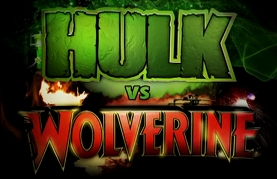
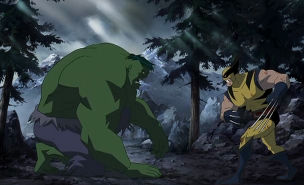 Or, more accurately, Wolverine vs. Hulk. Obvious made to piggy-back off Hugh Jackman’s X-Men Origins, the first feature does a wonderful job of going over well-traveled ground. A Brownie Scout with a compass can do the same, but who am I to fault the comics industry for eating its dead?
Or, more accurately, Wolverine vs. Hulk. Obvious made to piggy-back off Hugh Jackman’s X-Men Origins, the first feature does a wonderful job of going over well-traveled ground. A Brownie Scout with a compass can do the same, but who am I to fault the comics industry for eating its dead?
Specifically, Hulk vs. Wolverine brings The Incredible Hulk #180 (1974) to a cartoon semblance of life. After a brief prologue. we meet Wolverine (Steve Blum – a versatile voice actor most famous for providing the English voice of Spike Spiegel) during his days as a tool of the Canadian Government, sometime prior to joining up with Professor Charles Xavier’s so-called “team”. It seems the Hulk (Fred Tantasciore – reprising his role from Ultimate Avengers) has made a successful run for the boarder. As a well-dressed Royal Air Force suit tells Logan, “Intel’s sketchy. Department H thinks the U.S. military’s covering something up.” Really? The U.S. military? Covering something up? Well, I never.
Charged with hunting the Hulk (“Sounds like fun”) through Canada’s alpine forests, Wolverine proceeds to do what he does best, running through the woods in pursuit of the “toxic” scent. He finds it embodied in the skinny, sobbing form of one Dr. Robert Bruce Banner (Bryce Johnson). Wolverine, true to his form, responds to Banner with threats, contempt, and murderous intimidation that borders on assault and battery. Cue transformation. Cue fight scene.
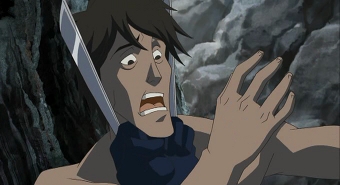 And what a thing it is. Brutal, bloody, full of gratuitous claw-popping. Everything a child raised on high fruitose corn syrup and Ritalin could ever hope for from a superhero film. Thankfully, a plot intervenes after a few minutes of this inconclusive bloodletting (and that’s not an dig, just a description): Weapon X’s plot, to be exact. After the Hulk and Logan have tired themselves out, the villainous team of sociopathic, metahuman covert operators rushes in and takes both combatants hostage.
And what a thing it is. Brutal, bloody, full of gratuitous claw-popping. Everything a child raised on high fruitose corn syrup and Ritalin could ever hope for from a superhero film. Thankfully, a plot intervenes after a few minutes of this inconclusive bloodletting (and that’s not an dig, just a description): Weapon X’s plot, to be exact. After the Hulk and Logan have tired themselves out, the villainous team of sociopathic, metahuman covert operators rushes in and takes both combatants hostage.
Through the miracle of a dream sequence, we once again experience Logan’s short-but- bloody history with Weapon X. We see his kidnapping outside a honky-tonk bar, his animalistic confinement (chained to the floor in a lightless pit), the torturous scientific experiments that effectively erased his mind and coated his bones in unbreakable metal, and his bloody escape. All of which is presented with much more gory detail than any on-screen depiction I’ve see.
Despite all that, Weapon X wants Wolverine back. “Things haven’t been the same around here.” So says Deadpool (Nolan North), the team’s Odious Comic Relief. “Nobody calls me ‘Bub,’ anymore!” Add standard Wolverine rogues like Sabretooth (Mark Acheson) and Lady Deathstrike (Janyse Jaud) to the mix and you have a complete set. The gang’s all here, under the direction of a mad (and, thanks to Logan, one-handed) Professor (Tom Kane). Will Logan escape their deadly clutches? And if he does, will he bother to free Bruce Banner? If he doesn’t, will Weapon X manage to weaponize the Hulk? (Because that’s such a great plan, right? What could possibly go wrong with that?) Will the dastardly villains manage to “drop the Hulk on an orphanage, or something. Just for fun”? (Tactical planning, thy name is Sabertooth.) Will all this devolve into a giant, orgiastic fight scene?
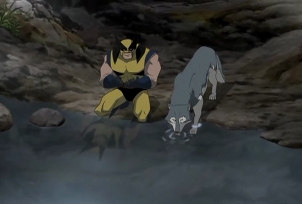 There is something elemental about a battle between our dual(ing) protagonists; something that’s spoken to Marvel creators and fans again and again over the years. I am neither of those in a proper sense, so I can only guess at the root of their fascination with this match-up. There is no comparable rivalry within the DC Comics Universe(s), and the whole thing has the air of a title bout to it. Because after all, “Hulk is strongest there is!” And Wolverine is a living example of Angel-the-vampire-with-soul’s admission that, “Being virtually indestructible is pretty cool.” Together, they create a perpetual fight scene, shockingly brutal for a superhero cartoon produced by gaijin entertainment companies for a presumably gaijin audience. And I say it’s about damn time. I am, at all times, for shocking depictions of violence in any “media,” especially those aimed at children. But is it too much to ask that Marvel animation at least try to give us something…I don’t know…more?
There is something elemental about a battle between our dual(ing) protagonists; something that’s spoken to Marvel creators and fans again and again over the years. I am neither of those in a proper sense, so I can only guess at the root of their fascination with this match-up. There is no comparable rivalry within the DC Comics Universe(s), and the whole thing has the air of a title bout to it. Because after all, “Hulk is strongest there is!” And Wolverine is a living example of Angel-the-vampire-with-soul’s admission that, “Being virtually indestructible is pretty cool.” Together, they create a perpetual fight scene, shockingly brutal for a superhero cartoon produced by gaijin entertainment companies for a presumably gaijin audience. And I say it’s about damn time. I am, at all times, for shocking depictions of violence in any “media,” especially those aimed at children. But is it too much to ask that Marvel animation at least try to give us something…I don’t know…more?
Like a story we haven’t seen twenty-some-odd times before. I know Wolverine’s origin is horrible and all…but come on. Must every one of his films pivot on that dramatic axis? Or should we consider the rest of Logan’s thirty-year comic book history unfilmable? It is steeped in Marvel lore, and Wolverine’s popularity has assured his intimate involvement in more-or-less every major event that besets his home universe, from World War II to next week’s Apocalypse. One would think mining that for all it’s worth, and feeding the result into the Great Cinematic Mill (the way DC’s masters at Warner Bros. continue to do with Clark Kent’s childhood) would be the first thing on Isaac Perlmutter’s To Do List (right above “Cash in More Remington Stock – Make Self Richer Than Dreams of Avarice”).
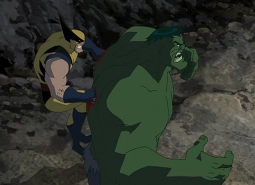 Nevertheless, Steve Blum does a great job in his role…such as it is. Who better for that than a man who cut his voice-acting teeth on everything from old Super Nintendo games to badly-dubbed anime imports? In his sixth time as Wolverine, Blum slips right into Logan’s voice with out the slightest hitch.
Nevertheless, Steve Blum does a great job in his role…such as it is. Who better for that than a man who cut his voice-acting teeth on everything from old Super Nintendo games to badly-dubbed anime imports? In his sixth time as Wolverine, Blum slips right into Logan’s voice with out the slightest hitch.
Unfortunately he (along with everyone else behind the camera), in the great tradition of straight-to-video animation, gets precious little to do. While the Hulk and Wolverine may be complementary characters, neither is the height of perspicacity. Wolverine and Bruce Banner, on the other hand, are fundamentally incompatible. Neither goes through anything resembling a dramatic arc since there’s so little drama to go around. At least Len Wein allowed the Hulk to knock Wolverine out back in ’74, giving us some resolution, but the makers of Hulk vs. Wolverine are careful to deny anything to partisans of either stripe. This is fully Wolverine’s movie, with the Hulk making a special guest appearance and Bruce Banner, the most complex and heroic character here (by virtue of the fact that he displays the capacity to think beyond the immediate, and about something other than himself), relegated to a cameo.
“Bub,” Wolverine asks Banner during their one and only real conversation, “do I look like I give a – ?” He means to say, “shit,” but is decorously interrupted by an attack from Deadpool and Omega Red, inaugurating the final fight scene. And that, more than anything, sums up this movie. It refuses to give a shit about anything besides fighting. With its source texts updated and heavily condensed, director Frank Paur thinks nothing about distracting us with his pretty pictures. I’m just glad whatever committee he had looking over his work allowed him to show blood. What “happy violence” there is comes thanks to the fact that Weapon X seems to have some sort of Affirmative Action program for cyborgs, allowing the self-consciously “bad” guys to be easily smashed.
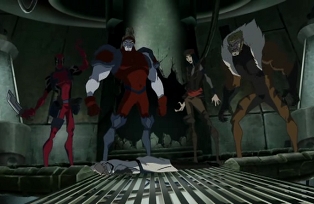 And I’m all for that. There’s a cathartic element to watching the Hulk do what he does. Even Logan recognizes this near the end of things. “Go for it, big guy,” he says (and this is the one and only moment in the film where Wolverine comes close to displaying a genuine human emotion: joy) as the Hulk decimates Weapon X’s facility. “Tear this whole godforsaken place down the ground!”
And I’m all for that. There’s a cathartic element to watching the Hulk do what he does. Even Logan recognizes this near the end of things. “Go for it, big guy,” he says (and this is the one and only moment in the film where Wolverine comes close to displaying a genuine human emotion: joy) as the Hulk decimates Weapon X’s facility. “Tear this whole godforsaken place down the ground!”
Perhaps that’s the appeal. Perhaps the Hulk and Wolverine are more kindred spirits than their obvious differences would suggest. Both are barely-restrained ids who revel in destruction. Both are highly sympathetic characters shot through with pathos, provided we, the audience, are given a chance to see that. Seeing the two come to some sort of terms would’ve been nice. As with so much else, comics have shown us the way. It’s up to movie producers, writers, and directors to pick up the batons they’ve left scattered through the years…or not, as in this case.
And while I can completely sympathize with those who revel in smashing it all, I’d prefer to see such cathartic events contained within an actual film (like Ang Lee’s Hulk) rather than an extended fight scene. If that’s what you’re after, look no further. The rest of us will be enjoying our second feature:
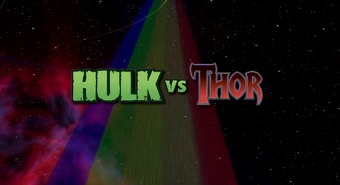
is just such a film, with a little bit of everything: betrayal, revenge, godly plots and plans, an exploration of the fundamental order of the Marvel Universe, and plenty of inarticulate Hulk-ery. It’s not a great film. No, sir. But it is at least a little more than an origin story.
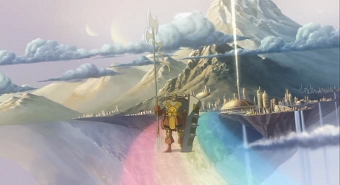 As the voice over explains, the realm of Asgaard exists outside the world we know. There, Odin the All-Father (French Tickner) commands the respect and (relative) obedience of the rest of the Norse gods. But for seven days every winter Odin must rest and recover his strength, opening Asgaard up to assault from all manner of “immortal evil.” So for seven days every year trolls, frost giants, and good ol’ fashion orcs take the opportunity to assail Asgaard’s gates under the command of Loki (Graham McTavish), God of Mischief. And every year they’re beaten back by the rest of Odin’s sons, under the command of the mighty Thor (Matt Wolf).
As the voice over explains, the realm of Asgaard exists outside the world we know. There, Odin the All-Father (French Tickner) commands the respect and (relative) obedience of the rest of the Norse gods. But for seven days every winter Odin must rest and recover his strength, opening Asgaard up to assault from all manner of “immortal evil.” So for seven days every year trolls, frost giants, and good ol’ fashion orcs take the opportunity to assail Asgaard’s gates under the command of Loki (Graham McTavish), God of Mischief. And every year they’re beaten back by the rest of Odin’s sons, under the command of the mighty Thor (Matt Wolf).
Frustrated by this endless cycle of defeat, Loki teleports Bruce Banner (who at one point held the title of “world’s mightiest mortal” before that little snot Billy Batson went and copyrighted it) into the Asgaardian realm. “Because in all the universe only you have ever brought near-defeat to the mighty Thor.” Postulating that Bruce Banner’s consciousness is the only thing inhibiting the Hulk’s power, Loki and the Goddess of Love, Amora (Kari Whalgren) (whom Thor spurned to marry the goddess Sif (Grey DeLisle) the Sheildmaiden), physically separate the two. Banner’s vehement protestations go ignored. After all, what could possibly go wrong, right? With a de-Bannered Hulk under his psychokinetic control, Loki sets out to batter his “oafish, arrogant brute of a stepbrother” and take Thor’s place as…something or other.
But, as we know, Hulk is strongest one there is. In mid-battle, the Hulk’s all-consuming rage proves too much for Loki, shattering their mystical bond. Free of any mitigating influence whatsoever, the now-quite-Savage Hulk proceeds to lay waste everything in sight…making a b-line for the citadel of sleeping Odin himself. Will Thor, Loki, Hela the Goddess of Death (Janyse Jaud), and the disembodied soul of Bruce Banner (still Bryce Johnson) halt the Hulk before he smashes his way through the very fabric of existence?
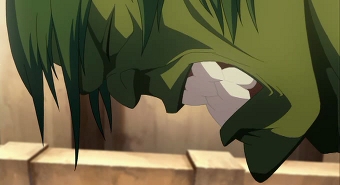 Now, on occasion, I loves me some high fantasy. And here it is for all of who love it too. After all, if you’re going to play with the whole Norse pantheon, why not throw the Hulk at them? Watching the result is good (if predictable) fun. And as usual, I’ve found something pseudo-philosophical to latch onto. After all, the whole Rangnarok concept raises all kinds of questions of free will. And thank the gods writer Christopher Yost was smart enough to make Thor worry about this too, even if only in two scenes. Must the endless cycle of violence continue? Is Rangnarok the only alternative? After you avert one near-Apocalypse, what’s to stop you from averting the next? Other than, you know, “fate” and all?
Now, on occasion, I loves me some high fantasy. And here it is for all of who love it too. After all, if you’re going to play with the whole Norse pantheon, why not throw the Hulk at them? Watching the result is good (if predictable) fun. And as usual, I’ve found something pseudo-philosophical to latch onto. After all, the whole Rangnarok concept raises all kinds of questions of free will. And thank the gods writer Christopher Yost was smart enough to make Thor worry about this too, even if only in two scenes. Must the endless cycle of violence continue? Is Rangnarok the only alternative? After you avert one near-Apocalypse, what’s to stop you from averting the next? Other than, you know, “fate” and all?
Adolescent boys from thirteen to thirty-two need not fear: such questions are left decorously (almost slyly) aside, never once getting in the way of what is, once again, basically a forty-five minute fight scene. The broad swipes of characterization fly by at near-Quicksilver speed, almost necessitating a preexisting knowledge of these characters and their themes. The Asgaardians suffer mightily from this. You know Thor and Loki by their proscribed roles as Hero and Villain, but I’m sure actual fans of Thor’s world will be let down by the spare treatment Volstagg (Jay Brazeau), Fandral (Jonathan Holmes), Hogun (Paul Dobson), and Balder (Michael Adamthwaite) receive at our filmmaker’s hands. “Paltry” is a good word for it. “Slipshot” is another. “Mighty” as Thor may be he is only one god among many, and this film could (and probably should’ve) been improved by more from the Children of Odin. Looking at this “oafish” crew as they’re presented here, I can’t help but feel a little sympathy for Loki. Repeated losses to this bunch of drunkards, boasters, and Fabio-alikes would rattle my cage too. Talk about “eternity.”
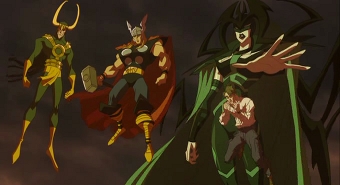 As with any good Hulk story, Bruce Banner’s presence saves the film from being a ceaseless testosterone parade. Separated from his “better half,” Banner’s whinny-but-well-informed voice of reason quickly pushes Loki’s “kill” button. Thrown into, and then raised up out of, Viking Hell (now with 80%-less torment than Judeo-Christian Hell), Banner faces the moral choice of moving on to his eternal reward (and risking the destruction of the universe) or returning to the life of torment we all get off on watching him suffer through. The outcome of his choice is predetermined, but that does nothing to lessen the impact of watching Banner do what he gets far too little credit for: being a hero. That is, making a moral choice involving a personal sacrifice in the name of preserving your community – whether that be a neighborhood, a species, a planet, or the whole of existence. It’s an act the Asgaardians rightly toast after the smoke clears. Led by Odin himself, they “hail the mortal: Bruce Banner!” As should every film that features him.
As with any good Hulk story, Bruce Banner’s presence saves the film from being a ceaseless testosterone parade. Separated from his “better half,” Banner’s whinny-but-well-informed voice of reason quickly pushes Loki’s “kill” button. Thrown into, and then raised up out of, Viking Hell (now with 80%-less torment than Judeo-Christian Hell), Banner faces the moral choice of moving on to his eternal reward (and risking the destruction of the universe) or returning to the life of torment we all get off on watching him suffer through. The outcome of his choice is predetermined, but that does nothing to lessen the impact of watching Banner do what he gets far too little credit for: being a hero. That is, making a moral choice involving a personal sacrifice in the name of preserving your community – whether that be a neighborhood, a species, a planet, or the whole of existence. It’s an act the Asgaardians rightly toast after the smoke clears. Led by Odin himself, they “hail the mortal: Bruce Banner!” As should every film that features him.
Unfortunately, there’s a tendency to hail the Hulk at Bruce Banner’s expense. Both “episodes” of Hulk Vs. suffer form this, along with a problem of length. Modern movie-makers are incapable of being epic in under 45 minutes; Jim Cameron and Peter Jackson have taught them too well. And while Hulk vs. Wolverine is a textbook case of good dialogue-as-characterization, Hulk vs. Thor shows the pitfalls of this. Bad dialogue can turn revealing statements into hackneyed crap right quick, especially when it’s spiced with unnecessary “nays,” “thees,” and “thous.” I appreciate literal interpretations of source material as much as the next nerd, but I can’t help but laugh at lines like, “Let us give unto this scoundrel the gift of battle!”
That aside, the films are as distracting as they can be under the circumstances. They won’t fill an evening, but they will give you that kick only comic book mayhem can bring. They should’ve been longer, and at least PG. But they are vast improvements over previous Marvel cartoon efforts. If it’s your bag, enjoy.
Hulk vs. Wolverine
![]()
![]()
![]()
Hulk vs. Thor
![]()
![]()
![]()
